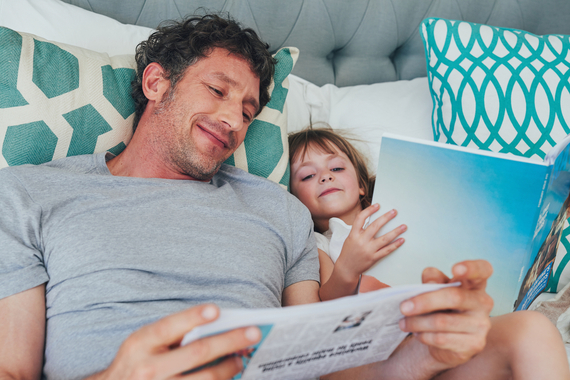There are so many modern parenting guides for raising successful (and intelligent, moral, creative, vegan, eco-friendly, bilingual, and musical) children, that trying to navigate the child-care section at the bookstore--let alone parenting itself--can be confusing.
The sheer number of parenting books highlights our concern for our kids' well-being. But our well-intentioned desire to shape our children's future has developed into major anxiety about their safety, happiness, and ability to succeed.
This anxiety is the heart of over-parenting, or helicopter parenting.
But the more we anxiously try to make sure our kids become thriving adults, the more we're communicating anxiety and passing it down to them. That means our obsession with doing everything right actually has the opposite effect on kids than we intend. Children of helicopter parents are more anxious, depressed, and emotionally dependent on their parents than kids that aren't coddled.
But, perhaps ironically, much of the analysis on the negative effects of helicopter parenting focuses on the children.
What about the parents? The fact is that helicopter parenting is detrimental to us, too. Here's how over-parenting makes you miserable, and ways to take back your life to the benefit of your whole family.
3 Ways Being a Helicopter Parent is Bad for You
1) Helicopter parenting makes you unhappy.
A 2012 report in the Journal Of Child And Family Studies found that mothers with an "intensive parenting attitude" were more depressed than mothers who were more laissez faire. Keep in mind that laissez faire doesn't mean not caring and not keeping kids safe, healthy and happy.
The study also found that mothers who believe parenting is "difficult" or that parents' lives should revolve around their children also reported less satisfaction with their own lives.
2) Parents are more overwhelmed and time-crunched than ever.
Since studies show mothers spend more time with their kids than they did in 1965, when women largely weren't in the workforce--your intense parenting schedule is probably leaving you exhausted. The important lesson from the research: quality time is more important than the amount of hours you spend with your kids. While mothers still tend to spend more time with their children than fathers, a helicopter parenting-attitude would likely have similar emotional effects for men.
3) There's a strong connection between anxiety and over-parenting.
Ours fears generate anxiety. Because we want to protect our children from harm and ugliness in the world, we project our worst fears onto them. But "over time, parents can become hypervigilant for any signs of trouble in an attempt to cut it off at the pass," Kara Fitzpatrick, a clinical psychologist and expert in adolescent health at Stanford University, explains.
"In general, when we're anxious, we try to avoid strong negative emotions, like disappointment and upset. As a result, our anxiety can cause us to work hard to make certain our children never experience those negative emotions. Of course, this ignores the fact that everyone experiences upsetting feelings, and that they're an opportunity to learn emotional resilience," Fitzpatrick says.
Many helicopter parents try to protect their children from disappointment and struggle by setting them up for college and career success. Remember the craze around Tiger Moms? The book struck a nerve among many parents suggesting their fear was true: that they weren't doing enough to make their kids successful.
But as shuffling kids to multiple extra-curriculars and doing homework over dinner becomes the new norm, we're diverting more of our resources from ourselves and pouring them into our kids. And it's not to the parents' or children's benefit.
Fitzpatrick argues that over-planning for the hard skills children will need in the future is futile.
"In my generation, parents wanted their children to be stockbrokers, lawyers and doctors. Parents of today want their children to be engineers. We can't tell what the skills of tomorrow are. Instead we should focus on developing adaptive, creative, resilient children who can meet the demands of their future."
3 ways to reclaim your life to benefit the whole family
There are things you can do to overcome your tendencies to protect your children (just a little too much). Click here to find out 3 ways to take back your life (for your whole family's sake).
This article first appeared on Lantern's blog, which shares expert advice and research on strengthening emotional well-being.
